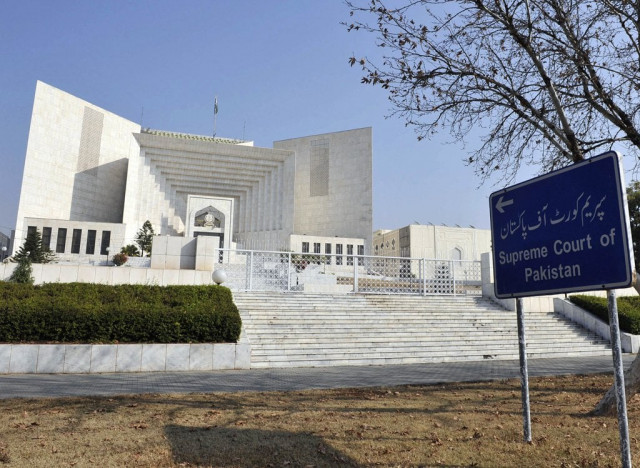SC orders legal action against faslse testimonies
31-page verdict declaring Latin rule integral part of jurisprudence in criminal cases

Supreme Court of Pakistan. PHOTO: AFP
The Latin rule holds that a witness who testifies falsely about one matter is not credible to testify about any matter because “the presumption that the witness will declare the truth ceases as soon as it manifestly appears that he is capable of perjury” and that “faith in a witness's testimony cannot be partial or fractional”.
Chief Justice of Pakistan Asif Saeed Khosa in the 31-page verdict on Wednesday also directed that a witness found by court to have resorted to deliberate falsehood on a material aspect “shall, without any latitude, invariably be proceeded against for committing perjury”.
PM welcomes CJP's statement on punishing those who give false testimony
The court noted that the rule “falsus in uno, falsus in omnibus” had in the past been held by the superior courts of this country to be inapplicable to criminal cases which had gradually encouraged and emboldened witnesses appearing in trials of criminal cases to indulge in falsehood and lies, making it more and more difficult for the courts to discover truth and dispense justice.
The judgment says by declaring that the Latin rule is inapplicable in Pakistan is enunciation of a principle of law and has a binding effect in view of Article 189 of the Constitution.
CJP vows stern action against false testimonies
“If inapplicability of that rule militates against the injunctions of Islam and if such inapplicability cannot be enacted by parliament on account of its repugnance to the injunctions of Islam, then this court may not be in a position to introduce such inapplicability through an enunciation of a principle of law or to continue with the same anymore.”
The court also held that a court of law cannot grant a licence to a witness to tell lies or to mix truth with falsehood and then take it upon itself to sift grain from chaff when the law of the land makes perjury or testifying falsely a culpable offence.
“A court also has no jurisdiction to lay down a principle of law when even parliament is expressly forbidden by the Constitution from enacting such a principle as law.
“The inapplicability of this rule in Pakistan was introduced by Chief Justice Muhammad Munir in 1951 at a time when Article 227 of the Constitution was not in the field, but after the introduction of the said constitutional prohibition the enunciation of law by his lordship in this field, like the infamous “doctrine of necessity” introduced by his lordship in the constitutional field, may not hold its ground now, as already predicted and foreseen by this court in the case of Ghulam.”
“A judicial system which permits deliberate falsehood is doomed to fail and a society which tolerates it is destined to self-destruct. Truth is the foundation of justice and justice is the core and bedrock of a civilised society and; thus, any compromise on truth amounts to a compromise on a society’s future as a just, fair and civilized society.
“Our judicial system has suffered a lot as a consequence of the above-mentioned permissible deviation from the truth and it is about time that such a colossal wrong may be rectified in all earnestness,” the ruling.
It is also said that the aim while deciding criminal cases ought not to be to “get at the truth” but to decide a matter in light of settled legal principles with the sole focus on determining whether the evidence on the record proves the guilt of the accused person in accordance with the requisite standard, i.e., beyond reasonable doubt or not.
“We, through our experience, are of the opinion that trying to ascertain the truth, although a noble and ideal effort in its own right, may prove to be a slippery slope as the full facts of any criminal case are never presented before a court.
“For a judge to do complete justice and to get to the truth in a criminal case, he needs, as a matter of necessity, to have in his knowledge all of the facts relevant to the case at hand.
“As that is never the case, the rule of law and consistency in approach can be only fostered and strengthened if criminal cases are decided in a uniform way and only and only in light of the settled principles of evidence, not by bringing in subjective and practical considerations, which invariably will vary from one judge to the next.”
The court while criticising former chief justice Muhammad Munir said he was of the view that the job of a judge was to discover the truth whereas in our system of criminal justice discovering the truth is the job of the investigating agency and the judge is to decide as to whether the allegations being leveled against an accused person have been proved by the prosecution in accordance with the law or not.
“Such blurring of the distinction between the jobs of an investigator and a judge in the reasoning of Muhammad Munir, had remained unnoticed in all the subsequent cases on the subject.
The said obscurity has, unfortunately, gone a long way in distorting the criminal jurisprudence in the country besides demeaning the virtue of truth and corrupting the sacred concept of justice by extending a license to witnesses to tell lies and reducing the judge to a lie detector sifting grain from the chaff and looking for a reason to convict an accused person on the basis of statements of witnesses on oath or solemn affirmation which statements have been established to be not “the truth, the whole truth and nothing but the truth”.



















COMMENTS
Comments are moderated and generally will be posted if they are on-topic and not abusive.
For more information, please see our Comments FAQ